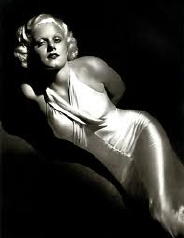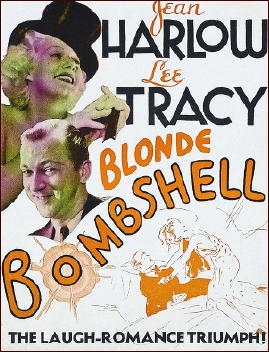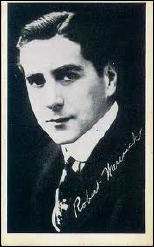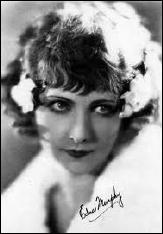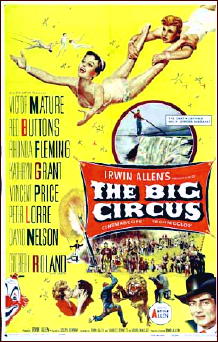Reviewed by DAVID L. VINEYARD:
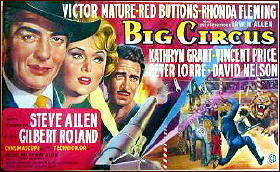
THE BIG CIRCUS. Allied Artists/Warner Brothers, 1959. Victor Mature, Rhonda Fleming, Red Buttons, Gilbert Roland, Vincent Price, Kathryn Grant, Peter Lorre, Adele Mara, David Nelson, Howard McNear, Steve Allen. Screenplay by Irwin Allen, Irving Wallace, Charles Bennett, based on a story by Irwin Allen. Director: Joseph M. Newman.
Hokum is usually a detrimental comment on anything, but in this case it is a compliment to this bright entertaining circus movie from producer Irwin Allen.
Victor Mature is ideally cast as Hank Whirling, a man with sawdust in his blood, who has just split with his partners, the ruthless Borman brothers, and needs to float a loan to keep the Whirling Circus in business. To that end he ends up saddled with banker Randolph Sherman (Red Buttons) and publicity agent Helen Harrison (Rhonda Fleming), neither of whom he wants.
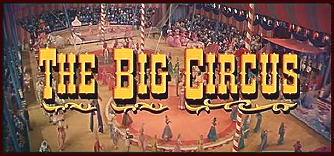
The Whirling Circus is a family affair; the prime players being ringmaster Hans Hagenfeld (Vincent Price), sardonic clown Skeeter (Peter Lorre), high wire and trapeze stars The Great Calinos, Zach and Mary (Gilbert Roland and Adele Mara), their catcher Tommy Gordon (David Nelson), and Hank’s sister Jeanie (Kathryn Grant) who dreams of working the trapeze one time before she settles down (her mother fell to her death from the trapeze).
Money problems and his unwanted partners aren’t all that plague Hank — sabotage paid for by the Bormans is making his life doubly difficult: a lion escapes and threatens a press party, a fire breaks out and threatens the animals, a train wreck kills two people, one of them Mary Calino, and strands the show. Add to that bad weather and the bank threatening to sell the show to the Bormans and only a miracle can save them.
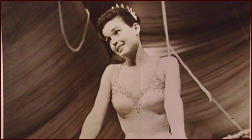
Said miracle being Zach Calino walking the high wire across Niagara Falls But just before he is to make the walk his wife (Adele Mara) is killed in the train wreck and Zach loses his nerve. Hank makes him mad enough to go through with it, but at the risk of losing his oldest friend.
And now the saboteur within the circus plans to strike while the circus plays in New York on the Steve Allen Show while Mature has to keep a low profile to avoid the man sent from the bank to foreclose (Howard McNear — Floyd from the Andy Griffith Show).
It all builds to a suspenseful finale as the killer is trapped in the center ring as the cameras roll, after trying to kill Jeanie when she makes her debut with Zach Calino on the trapeze.
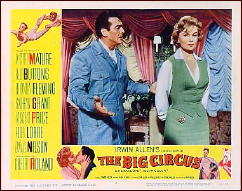
The mystery element is done fairly well, with suspicion falling on almost everyone — particularly Vincent Price — mostly because he is Vincent Price, and in 1959 when this was released almost no one would have guessed who the real culprit would turn out to be.
Less a least likely suspect than an almost unthinkable one — at least then. Granted, we perverse minded mystery fans probably would have guessed, but then we’re a suspicious and mistrustful lot given to cynicism and thinking the worst of suspects.
A good many circus films have been made, and most of them are usually quite good; the setting seems to bring out the best in everyone involved. This one holds its own despite the cliches like the lovers who start out hating each other, or Buttons repressed banker, or even Grant as the girl who just wants a home that doesn’t have wheels on it.
The movie is certainly worth seeing, and a fine cast is in fine fettle along with a well written script and more than competent direction along with good camera work and a catchy score add up to a film that is probably better than it deserves to be.
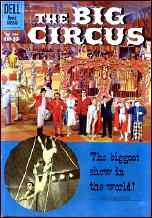
All the performers are at their best with Buttons more subdued than usual, and Kathryn Grayson in a non-singing role is fresh and attractive. Rhonda Fleming is as gorgeous as usual, and no movie was ever worse for the presence of Gilbert Roland. Price and Lorre both have their moments, and Victor Mature has a nice presence in the kind of part he often played as a fast talking faster thinking promoter with a heart well hidden behind the million dollar smile.
On a note of irony, at one point after the train wreck the circus is stranded and Mature has the idea to use the elephants, “like Hannibal,” to get to their next play date. The next year Mature played Hannibal in Edgar Ulmer’s film of that name. Whether the reference is an in joke or a coincidence I don’t know.
For those interested, you can even download the Dell comic book version of the movie for free. The movie itself is available on DVD from Warner Archives.
The Big Circus may not be as gaudy as de Mille’s wide screen Greatest Show on Earth or Samuel Bronston’s Circus World (with John Wayne), but it is entertaining and smart, hits all the marks, and delivers exactly the thrills, smiles, and laughs it intends, and does so with a more than usually attractive and capable cast. It’s pretty big entertainment, even on the small screen.

